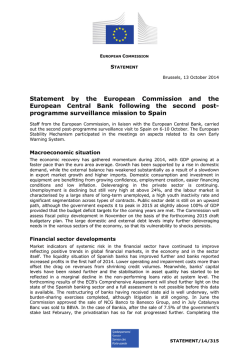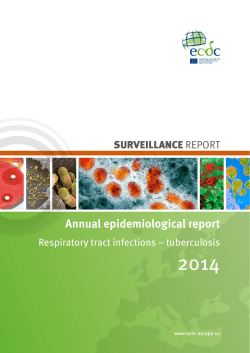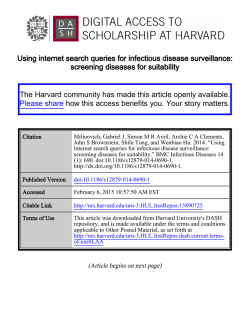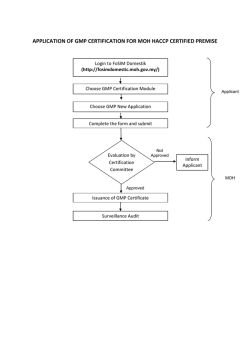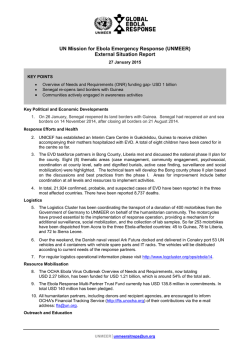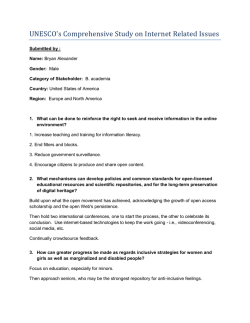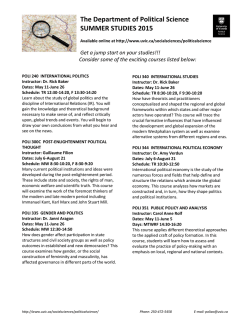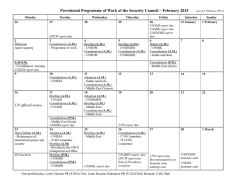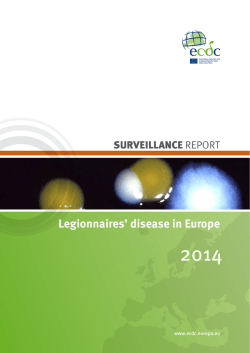
PHE Syndromic Surveillance Summary
PHE Syndromic Surveillance Summary Produced by the PHE Real-time Syndromic Surveillance team Year: 2015 28 January 2015 Syndromic surveillance national summary: Week: 4 Reporting week: 19 to 25 January 2015 During week 4 there were small increases in a number of respiratory indicators in children aged less than 15 years across several syndromic surveillance systems. Remote Health Advice: NHS 111 calls for respiratory indicators, including cold/flu, cough and difficulty breathing calls remained stable during week 4 (figures 2, 4, 5). There were, however, small increases observed in the 1-4 and 5-14 years age groups for cold/flu calls and <15 years for cough calls (figure 2a, 4a). Click to access the Remote Health Advice bulletin [intranet] [internet] GP In Hours: During week 4 there were small increases in GP consultation rates for influenza-like illness, upper respiratory tract infection and severe asthma in children aged less than 15 years (figures 1a, 2a, 10a). Click to access the GP In Hours bulletin [intranet] [internet] Emergency Department: The recent decreases reported in attendances for respiratory, acute respiratory infection (ARI), influenza-like illness and pneumonia attendances stabilised during week 4 (figures 7, 8, 12 and13). There were, however, small increases in younger age groups (less than 15 years) for ARI (figure 9) and asthma/wheeze/difficulty breathing (figure 15). Pneumonia continued to decrease in the over 65 years age group during week 4 (figure 13a). Click to access the EDSSS bulletin [intranet] [internet] GP Out of Hours: There was a small increase in consultations for acute respiratory infections in the <1, 1-4 and 5-14 years age groups (figures 2 & 2a). There was also a small increase in consultations for influenza-like-illness during week 4 (figure 3). Click to access the GPOOHSS bulletin [intranet] [internet] RCGP Weekly Returns Service: Click here to access reports from the RCGP website [external link] PHE Syndromic Surveillance Summary 28 January 2015 Syndromic surveillance summary notes Syndromic surveillance systems Key messages are provided from each individual system. The different syndromic surveillance systems in operation within PHE access data from different areas of the national health care system. Each system is able to monitor a different selection of syndromic indicators based upon a different case mix of patients. Access to the full version of each syndromic surveillance bulletin is available through the Syndromic Surveillance website found at: (https://www.gov.uk/government/collections/ syndromic-surveillance-systems-and-analyses); reports will be made available on Thursday afternoons. Further weekly and annual reports are available from the RCGP Research and Surveillance web pages http://www.rcgp.org.uk/clinical-and-research/research-andsurveillance-centre.aspx Remote Health Advice A remote health advice syndromic surveillance system that monitors syndromic calls from remote health advice services e.g. NHS 111 each day across England GP In-Hours Syndromic Surveillance System A large UK-based general practitioner surveillance system monitoring daily consultations for a range of clinical syndromic indicators Emergency Department Syndromic Surveillance System (EDSSS) A sentinel ED network across England monitoring daily attendances and presenting symptoms/diagnoses GP Out-of-Hours Syndromic Surveillance System (GPOOHS) A syndromic surveillance system monitoring daily GP out-of hours activity and unscheduled care across England using a range of clinical syndromic indicators RCGP Weekly Returns Service (RCGP WRS) A sentinel GP surveillance network covering England and Wales monitoring weekly consultations for a range of clinical indicators. This surveillance system is coordinated by the RCGP Research and Surveillance Centre Acknowledgements: We thank and acknowledge the contribution of all data providers including: NHS 111 and HSCIC. Participating EDSSS emergency departments College of Emergency Medicine Advanced Health & Care and the participating OOH service providers QSurveillance®; University of Nottingham; EMIS/EMIS practices; ClinRisk® TPP, ResearchOne and participating SystmOne GP practices PHE Real-time Syndromic Surveillance Team Contact ReSST: syndromic.surveillance @phe.gov.uk Public Health England,6th Floor, 5 St Philip’s Place, Birmingham, B3 2PW Tel: 0344 225 3560 > Option 4 > Option 2 Fax: 0121 236 2215 Web: https://www.gov.uk/government/collections/ syndromic-surveillance-systems-and-analyses Page 2.
© Copyright 2026
